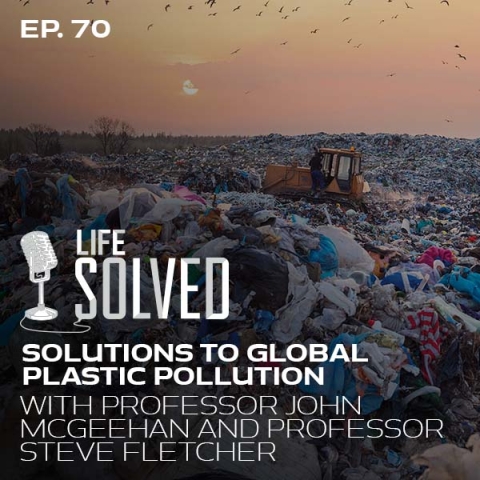

In the final episode of the series we meet up with Professor Steve Fletcher to explore a step-change in the way we’re thinking about the oceans as a natural resource
24 minute listen
Solutions to Global Plastic Pollution ft. Professor Steve Fletcher
What do oceans mean for our economies, and how do they play a role in a sustainable, healthy future for people and planet?
In the final episode of this series of Life Solved, the research podcast from the University of Portsmouth, Professor Steve Fletcher returns for an exciting update. We’re exploring the hidden depths of international ocean policy and economics to find out how the global plastics pollution crisis is being tackled.
Steve has been leading the University’s Revolution Plastics Initiative, which sees globally-acclaimed plastics researchers unite to transform the way we make, use and dispose of polluting plastic materials. Working with business, industry and scientists, the project has levelled up to the policy scale in order to broker relationships that can have an international impact.
The plastics pollution crisis sees some of the world’s poorest countries bearing the negative health and environmental impacts of wealthier ones. Steve says that in order to clean up the disposal process of the plastics we do still need to use is a challenge that crosses international boundaries.
Ocean ecosystems are not the only systems suffering under the strain of pollution. Our international livelihoods and wellbeing also rely upon a healthy balance here. Steve explains in the podcast:
Something like a billion people depend upon the protein we get from the sea. Something like half of the oxygen we breathe comes from the sea. And the sea is a really important carbon sink which is keeping our planet cooler than it would otherwise be
Professor Steve Fletcher, Director of the Sustainability and the Environment research theme at the University
The University is making waves in its research into plastics in the atmosphere, in nature, our homes, recycling and global policy. Revolution Plastics has brought science and policy together in order to help the UN Environment Programme establish a new global treaty to end plastic pollution. In March this year, the mandate for this was passed, stating that by the end of 2024, the law will support an ambitious, collaborative and international approach to stop plastic waste entering the ocean and environments.
And all that work feeds into large-scale solutions to the big three, interconnected crises we face as a planet right now: biodiversity loss, pollution and climate change. From decarbonisation to systemic changes in thinking, Steve explains how a circular economy approach will allow us to look differently at the life cycle of the resources our ocean provides for us.
In a Circular Economy we keep using the same resources again and again. And that's not just about recycling, although recycling is a big part of it. It's also about not using things we don't need in the first place
Professor Steve Fletcher, Director of the Sustainability and the Environment research theme at the University
Steve says that by looking at this on an international, collaborative scale, we can find solutions that span the oceans and leave our economies more resilient.
You can follow the work of Revolution Plastics on Twitter @UoPPlastics and find out more about research at the University of Portsmouth on our website.
Listen to the episode from Tuesday 14 June: Just search for “Life Solved” from the University of Portsmouth on your podcast app of choice, and why not share this story with a friend who might be interested.
